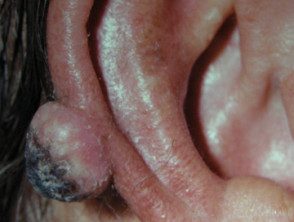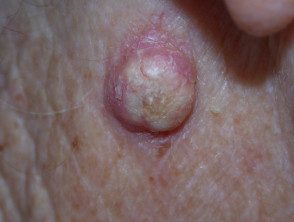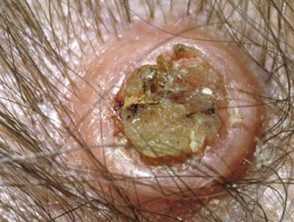Ad
Skin cancer
Application to facilitate skin self-examination and early detection. read more.
What is keratoacanthoma?
Keratoacanthoma is a skin. injury that erupts on sun-damaged skin, rather like a small volcano. It grows for a few months; then it may shrink and resolve itself. Keratoacanthoma is considered a variant of keratinocytes or notmelanoma skin Cancer, scaly cell carcinoma (SCC) Because it cannot be reliably distinguished clinically from more severe forms of skin cancer, keratoacanthomas are usually treated surgically.
Keratoacanthoma may begin at the site of a minor injury to sun damage and hair-bearing skin. At first, it may appear as a small grain or boil and may be squeezed, but it is found to have a solid core full of curb (scale) It then proliferates, and can be up to 2 cm in diameter by the time you tell your doctor.
Keratoacanthoma

Keratoacanthoma

Keratoacanthoma

Keratoacanthoma
See more images of keratoacanthoma.
What causes keratoacanthoma?
Keratoacanthoma arises from the hair. follicle skin cells for unknown reasons.
Some keratoacanthomas appear to be related to infection with human papillomavirus (HPV), the cause of warts, but most keratoacanthomas are not due to HPV.
What is the treatment for keratoacanthoma?
Keratoacanthomas must be treated for several reasons.
- To get pathology: Keratoacanthoma may be difficult to distinguish from invader squamous cell carcinoma.
- To get rid of an ugly, tender or worrying injury
- To minimize the scar, which can be more unpleasant if the injury resolves on its own.
Treatment requires destruction of the lesion. Options include:
- Cryotherapy (used only for small injuries <0.5 cm)
-
curettage and cauterization or other form of electrosurgery
- Excision
- Radiotherapy.
Keratoacanthoma follow-up
If keratoacanthoma comes back, it must be treated again.
Patients with keratoacanthomas are at risk for similar lesions and other types of skin cancer.
Multiple keratoacanthomas
There are some rare conditions in which multiple keratoacanthomas appear. These are:
- Grzybowski's eruptive keratoacanthomas
- Muir Tower syndrome
- Multiple self-healing scaly epitheliomas by Ferguson-Smith
- Centrifugal keratoacanthoma marginatum
- Drug-induced eruptive keratoacanthomas
- The responsible medications include BRAF inhibitors vemurafenib and dabrafenib, checkpoint inhibitors pembrolizumab and nivolumab, leflunomide, vismodegib, imiquimod.
Treatment requires surgery, as well as oral medications such as acitretin, methotrexate, or cyclophosphamide. Drug-induced eruptive keratoacanthomas induced by checkpoint inhibitors have responded to current steroids and intralesional steroid injections.

